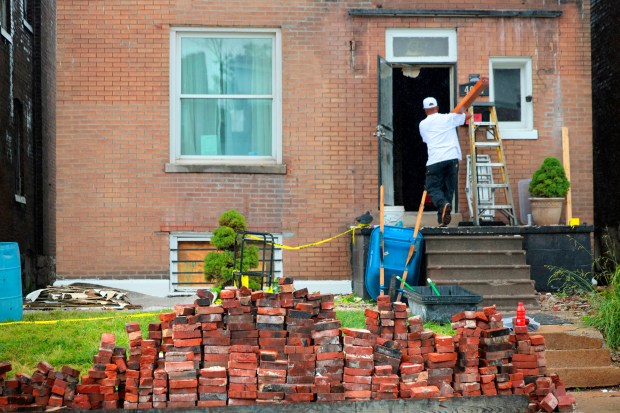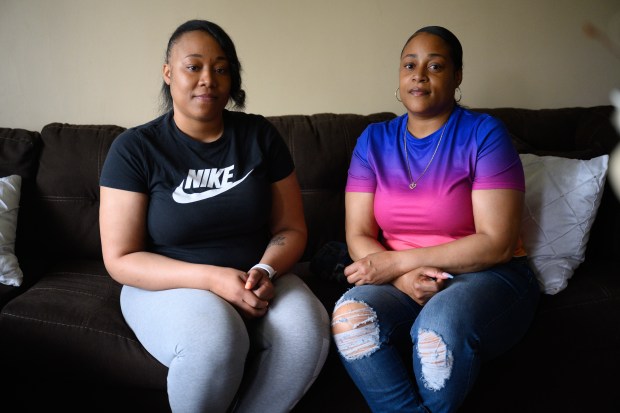Chicago police leaders touted their efforts to tackle robberies and carjackings Friday alongside Mayor Brandon Johnson.
Johnson joined Superintendent Larry Snelling to highlight the city’s efforts to use tools like helicopters, license plate readers and widespread surveillance cameras to catch criminals while trying to form better relationships with the community.
“We’re doing everything in our power to hold the offenders of these crimes accountable. Our officers are risking their own safety to apprehend these violent criminals,” Snelling said.
But as the two praised efforts to give police the tools to stop crime and repair fraught relationships with residents, they at first avoided the elephant in the room: the Tuesday release of body camera video showing the shootout in which a team of tactical officers making a traffic stop shot and killed 26-year-old Dexter Reed last month.
Reed’s death has once again sparked fierce debate across the city about the policing of people of color in Chicago. While authorities say Reed appears to have fired at police first, striking an officer, police have drawn criticism for drawing their guns while stopping Reed for a seatbelt violation and firing nearly 100 rounds during the Humboldt Park shootout that also left one officer wounded.
Until pressed by reporters Friday, Snelling and Johnson turned attention to their mostly already-in-place policing efforts, including strategies that will face a pre-summer test this weekend with a warm weather forecast.
Snelling said the city will “get out in front” of the sort of downtown teen gatherings that have caused a black eye for the city in each of the last two years by finding social media posts about the events and getting officers there before crowds arrive. In May 2022, a 16-year-old was shot and killed near Millennium Park’s “Bean” statue at one such meetup, while two teens were shot around the same area last April.
“What we don’t want to do is go overboard and we’re stopping teens who are down there to educate themselves or have fun,” Snelling said. “But for those who decide they want to go into downtown, wreak havoc, attack people, fight, take guns into these locations, destroy property, we’re going to arrest you.”
CPD’s Chief of Detectives Antoinette Ursitti praised the work of a police task force that has made 80 arrests and recovered 140 stolen and hijacked cars this year. Through March, motor vehicle thefts in Chicago are down 24% compared with the same period last year, while robberies are up 1% and murders down 5%, according to CPD data.
The three new police helicopters coming to the city will help the department further tackle the problem of cars getting stolen and later used in violent crimes, Snelling said. The purchases, made with federal funding, will double the department’s aging fleet.
“That air support will help us follow those individuals without engaging in a full blown vehicle pursuit, keep everyone safe,” Snelling said.
Later, Johnson praised the city’s “technology-driven approach.” However, his assessment of the ShotSpotter gunshot detection system used by police to more quickly respond to apparent shootings drew stark contrast with Snelling’s understanding of the police tool.
Johnson, who followed up on a campaign promise and shared plans to end the city’s use of the tool this fall, suggested the expensive technology “misses the mark.” But Snelling, who previously shared support for ShotSpotter, described it as an important aid for police.
“I’ve seen our officers get to locations quickly and I’ve seen them save lives,” he said.
Johnson and Snelling also discussed the importance of making progress on Chicago’s federal consent decree and community engagement. Snelling pointed to the public meetings he has held across the city.
When Johnson addressed the shooting Tuesday morning, he called it “deeply disturbing” and “extremely painful” while standing alongside Civilian Office of Police Accountability Chief Administrator Andrea Kersten and Cook County State’s Attorney Kim Foxx. Snelling, however, was notably absent from the news conference.
Instead, later Tuesday at a public meeting, he warned attendees asking about the shooting that “what you’re getting right now is people posting things in social media without all the facts.” The police department also released a brief statement acknowledging the shooting is under investigation.
On Friday, Snelling said he did not stand beside the mayor earlier in the week because “there was not much [he] could add.”
“I have to be very careful about what I say,” Snelling said Friday. “When you’re the police in this environment right now, and you have a police-involved shooting, anything you say can be taken as you being biased.”
Snelling rejected the idea that he and Johnson have a strained relationship and praised the mayor for giving him “autonomy.”
He criticized discussions of the shooting that draw conclusions before investigations are complete while calling for patience.
“We know what these types of situations can lead to. It’s a powder keg. Do we want to see our city burn?” he said.
jsheridan@chicagotribune.com




